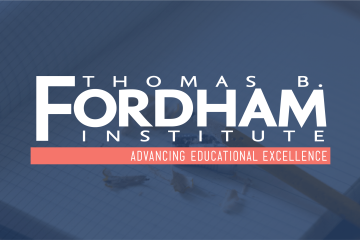After an eventful year of politics and controversy—with more lurking on the horizon—several friends have shared their apprehension about holiday gatherings. No one wants to see Grandma serve the turkey wearing her red hat or Uncle Bob stick a “We’re not going back” flag in the cranberry sauce. Rest easy, fellow citizens, as I am coming to your aid: Why not discuss the latest research on advanced learning over Thanksgiving dinner?
The past year has seen several high-quality reports on this topic. I have been fortunate to serve as an advisor or reviewer for several of these efforts, and it is energizing to have such resources cross my path. But with today’s fractured information environment, it’s easy for this work to slip off people’s radar screens—or to never have crossed them at all. I thought it would be helpful to call some of the best pieces to your attention.
Some things to discuss over appetizers
EdChoice Polling Results by Jen Madsen, Alli Aldis, Paul DiPerna, and me
What if offering advanced opportunities (in academics, the arts, sports, etc.) is more popular and more common than conventional wisdom would have us believe? To get at this question, Jen Madsen at the New Jersey Association for Gifted Children began working with Paul DiPerna at EdChoice to add questions on advanced learning to Morning Consult/EdChoice’s monthly public opinion polling on education. They brought me onboard to workshop some of the questions, to which they and others have added over time. Initial results (here and here) have been interesting and somewhat counterintuitive: Parents report that their children participate in advanced education much more often than other data sources suggest (over 40 percent versus less than 10 percent!), although huge participation gaps exist (e.g., low-income 34 percent versus high-income 66 percent, small town 31 percent versus urban 61 percent). In addition, roughly two-thirds of parents believe offering advanced opportunities is important for their children’s schools, and a third would consider moving their child if their current school eliminated advanced options. There is a lot more to these results, and I encourage you to dig into them.
Changing Opportunity working paper by Raj Chetty et al.
How do changes in social mobility impact how we think about talent, education, and our family’s well-being? The eminent economist Chetty and his colleagues provide data to help answer that question. Using census and tax data for 57 million Americans born between 1978–1992, the team tracked social mobility (defined as the difference between parent’s average household income at a specific age and their children’s average household income at the same age) for various birth cohorts. Interestingly, differences in social mobility between children born to high- versus low-income parents increased over time for White children, but that social mobility differences between Black and White children decreased over the same timeframe. The data suggest that the shrinking difference is due to increases in Black social mobility and decreases in White social mobility. They found evidence that these gaps also hold true when looking at educational attainment and mortality (i.e., class gaps widening, racial gaps shrinking).
The researchers note that focusing interventions on young children may have a greater impact on social mobility than focusing on young adults. Their results also suggest that interacting with peers with high parent employment is a positive predictor of social mobility, meaning that peer interactions may help form aspirations for a better life. Finally, they note that interventions targeting social capital, such as social support programs and programs that assist with networking, are just as important as programs focused on financial capital. The report’s findings appear to support many of our recommendations for shrinking excellence gaps, in that we often recommend that interventions start as early as possible, allow for bright students to interact and learn with each other as much as possible, and should be targeted in schools serving low-income communities, where low levels of social capital may limit children’s advanced opportunities. I highly recommend the study’s web site, which includes extensive presentation slides and overviews of the study.
Some things to discuss over dinner
Excellence with Equity: The Case for Rethinking Gifted Education by Peg Tyre
Where are we seeing new, promising approaches to advanced education? This report, prepared by the FutureEd think tank at Georgetown, dives deeply into efforts to diversify and strengthen advanced education programs. All of the profiled programs have had their challenges but are finding ways to greatly expand advanced opportunities for students—and in some cases, raise levels of advanced achievement and close excellence gaps. What I appreciate most about the report is the depth of analysis that Peg provides, having visited the districts of interest and conducted many interviews with stakeholders. My big takeaways after putting down the report was that there truly is a new, more inclusive approach to advanced education, it’s not easy to implement (primarily for political reasons), but the approach is do-able for most American schools and districts.
The Broken Pipeline by Adam Tyner
What are we learning about best practices in advanced education? The Fordham Institute has been the national leader in helping to answer that important question. A couple years ago, Fordham pulled together a national working group of researchers, educators, and parents to identify key findings from recent research and practice about how best to develop student talent. The resulting report includes thirty-six recommendations for how schools and states can promote advanced achievement in K–12 settings. Adam built on the Working Group report in this study, for which he surveyed districts and charter networks about the extent to which they were using the Working Group recommendations. Unfortunately—but predictably—Adam found little evidence that best practices are being widely used, even low-hanging fruit such as automatic enrollment, in which high-performing students are automatically enrolled in advanced coursework the following year. Given all we’ve learned over the past twenty-five years about how to promote our children’s talents efficiently and equitably, the current lack of advanced services in our schools is inexcusable. We know how to do this!
I also refer you to Adam’s earlier study with Meredith Coffey, Excellence Gaps by Race and Socioeconomic Status, which I’ve discussed elsewhere. It provides insights into how excellence gaps form and how we may be able to shrink and eventually eliminate them.
Think Again: Are Education Programs for High Achievers Inherently Inequitable? by Brandon Wright
How do we counterattack the many misunderstandings and stereotypes about advanced education? This policy brief, part of the Fordham Institute’s Think Again series, addresses common claims about advanced learning. These include the belief that advanced programs are ineffective, or that differentiated instruction is a sufficient and effective intervention to promote advanced learning. Brandon provides evidence countering much of the negative conventional wisdom, although it also confronts the gatekeeping mentality that makes it so hard to access advanced services in many schools.
Especially appealing is the focus on readiness grouping as opposed to ability grouping. The latter term tends to rankle many educators, and I’ve always wondered if one of the reasons teachers don’t use common-sense grouping practices is because the term rubs them the wrong way. I’ve tried “readiness grouping” a few times in my recent work, resulting in a range of reactions, from “That makes sense” to “That’s completely wrong.” I’m leaning into it, though, as the idea of adjusting instructional practices based on where students are is pretty much a modern definition of teaching and learning. I suspect most teachers have little problem with readiness grouping.
Differentiation of Instruction for Gifted Learners chapter by Joyce VanTassel-Baska et al.
But do we really need advanced education when differentiation takes care of everything? This study should make one wonder if differentiation is all it’s cracked up to be. I just stumbled across this 2020 article (hey, sometimes you miss stuff!). Dr. VanTassel-Baska and her colleagues have been at the forefront of creating and studying curriculum and instruction for advanced learners for decades. The research tells an interesting story: Differentiation is difficult, it rarely happens in mixed ability classrooms, but when it happens in well-supported advanced learning settings (e.g., AP courses), it is done well.
Studies such as this are important, as they provide evidence that effective differentiation is difficult and uncommon. This is important because critics of advanced education almost always point to mixed-ability differentiation as an alternative. We need more studies that closely examine the use of differentiation as the primary educational strategy for advanced learning. I suspect the evidence will continue to be negative.
Something to consider before the food coma hits
A senior administrator at my university recently shared that he and his peers question whether advanced education remains an important topic. My response was to point to these reports and papers as evidence that many people, both those within the field of advanced education and those outside of it, are turning their attention to this long-overlooked topic. Indeed, several of these resources note the extensive work that educators are doing in K–12 schools to provide high-quality advanced learning opportunities. There is momentum here!
That should be enough to get you through appetizers, dinner, and maybe even dessert on Turkey Day. Happy reading, and happy holidays to you and your family!




